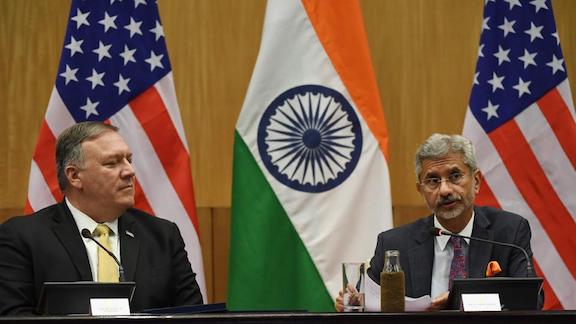Secretary of State Michael Pompeo and his Indian counterpart stressed the strength of their two countries’ ties after a day of meetings but reported little progress in resolving disputes over trade, defense and energy that have weighed on the partnership.
“Harmonizing our interests and our views, that’s really the task of diplomacy and I think Secretary Pompeo would agree with me today that we have earned our pay,” External Affairs Minister Subrahmanyam Jaishankar said at a briefing alongside the top U.S. diplomat in New Delhi Wednesday. He said a key part of having a strategic relationship “is to comprehend the other nation’s interest.”

Pompeo’s visit, which included a meeting with Prime Minister Narendra Modi earlier Wednesday, wasn’t intended to seal final agreements on the issues faced by India and the U.S., whose trade has grown close to $90 billion annually.
The trade dispute in particular has been waged outside the State Department, and is part of a broader push by Trump to correct what he says are decades of unfair trade deals that have disadvantaged the U.S. The U.S. is also pressing India and other countries in the region not to include technology from Huawei Technologies Co. in their 5G networks.
“We said we’d do our best to make sure that all the right people get in all the right places and work through these problem sets,” Pompeo said.
In a speech later Wednesday, Pompeo called for a “new age of ambition” for the two countries, saying they needed to overcome a “nagging misconception that our countries are not able to be full partners”—a reference to India’s Cold War alliance with the Soviet Union.
At the same time, Pompeo’s conversations and the remarks in the speech highlighted just how much the U.S. is demanding of India across so many fronts, while in return sticking to general promises of more defense contracts and closer economic ties.
Pompeo laid out those demands in the speech, including the pressure to cut oil imports from Iran and Venezuela, to steer away from Huawei, and to cut links with North Korea’s economy. He acknowledged that India’s decision to cut oil purchases from Iran and Venezuela came at a cost. The US is doing “everything we can’’ to ensure adequate fuel imports for India, he said.
A key for India has been ensuring reliable imports of oil now that it’s acquiesced to the U.S. demands as part of a bid to choke off Iran’s economy and force it to negotiate a new deal to constrain its nuclear program.
Jaishankar said he had “underlined the importance of stability, predictability and affordability in terms of energy imports.” India currently imports about 85% of its oil needs.









